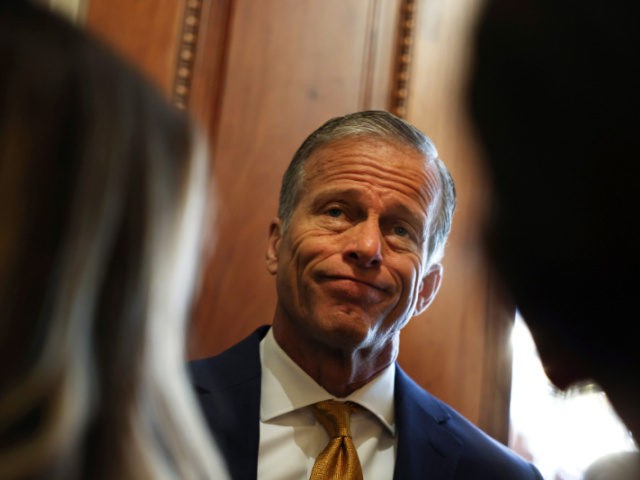Sen. John Thune (R-SD), the Senate GOP whip and a likely contender in any future battle to replace Mitch McConnell as GOP leader, is backing a bill that is effectively a bailout for the discredited corporate media.
The bill is called the Journalism Competition and Preservation Act (JCPA), and has been extensively covered by Breitbart News in the past.
It is unclear if Thune notified his GOP colleagues before he decided to co-sponsor the controversial Democrat-pushed bill. His office did not answer that question.
It is common knowledge in D.C. that Sen. Thune wants to be the next GOP leader in the Senate. So do Sens. John Cornyn (R-TX) and John Barrasso (R-WY), neither of whom have formally taken a position on the JCPA, This is the type of bill the base will be looking at as an early bellwether when the jockeying for leadership eventually takes place. Whatever Thine’s ambitions, he appears happy to risk alienating the base by supporting a bailout for one of the most despised institutions among Republicans: the corporate mainstream media.
The JCPA would create a cartel of media companies in the U.S., with the power to collectively negotiate with Big Tech companies for special favor, on top of the favors that Big Tech companies already provide voluntarily to the corporate media, including suppression of their competitors, artificial amplification in algorithms and search results, and billions of dollars in licensing fees.
Numerous witnesses have testified to the bill’s failings before the Senate and House, including award-winning journalist Glenn Greenwald, former local journalist Dan Gainor, and former federal antitrust enforcer Dr. Daniel Francis.
All explained how the bill would benefit America’s largest, wealthiest, and most corrupt media companies.
The GOP leadership in the House of Representatives has condemned the bill, with GOP leader Rep. Kevin McCarthy calling it the “antithesis of conservatism.”
In comments to Breitbart News, a spokesman for Sen. Thune defended the Senator’s position.
“Based on my experience in South Dakota, local newspapers and broadcasters always strive for honesty, transparency, and fairness in their coverage,” said the spokesman. “Ask any newspaper or visit any newsroom, and you can see firsthand the struggle these outlets are facing. Sen. Thune repeatedly hears from leaders in the South Dakota journalism industry who believe this bill would put them in a better position as they try to keep their operations above water. While this bill is unlikely to be a silver bullet, Sen. Thune is joining Sens. Paul, Graham, Kennedy, and others in lending support to an effort that gives local journalism a fighting chance.”
Thune’s office’s statement is notable for its admission that the bill is “unlikely to be a silver bullet” against Big Tech.
It is also notable in that Thune leans heavily for cover on other Republicans who have co-sponsored the bill, in particular name-checking specifically GOP Sens. Rand Paul (R-KY), Lindsey Graham (R-SC), and John Kennedy (R-LA).
Kennedy is the lead GOP sponsor in the Senate and has been working with Sen. Amy Klobuchar (D-MN) on the matter for over a year now.
The timing of Thune’s decision to throw his personal weight behind the JCPA is also interesting. Specifically, it comes just as the Senate Judiciary Committee has finally formally noticed the bill for markup but right after Senate Democrats screwed Senate Republicans over.
After Republicans negotiated in good faith with Democrats on the CHIPS Act to push semiconductor funding, the Democrats turned around and revived a core element of President Joe Biden’s agenda by passing a giant package via reconciliation on purely partisan lines. That good faith legislative attitude that led to the CHIPS plan passage and many other bipartisan deals over the past year and a half seemed to have been seriously soured in the wake of the Democrats’ move.
Thune does not seem to care as he has decided to plow forward with bipartisan deals despite the negative effect it has on Senate Republicans and in particular on McConnell.
Thune’s office did not respond to a specific question about this particular point.
Dan Gainor, head of the Media Research Center’s tech watchdog and formerly a local news journalist for 15 years, explained to a Senate committee earlier this year that the JCPA is likely to harm rather than help local news.
“We all want trustworthy, local journalism that helps inform the public as well as hold powerful people accountable,” said Gainor “Except that’s not how corporate media have handled local journalism in the past. Local outlets were treated as cash cows. Big corporations milked them and slaughtered the remains. This law would only serve to support huge existing corporate media instead of independent media.”
“Corporate media already benefits from better treatment by social media algorithms, than smaller independent outlets,” continued Gainor. “Consolidating their already enormous advantages only makes them even more powerful.”
Sen. Thune’s spokesman defended the Senator’s track record on the question of Big Tech.
“First, Sen. Thune will put his record of holding Big Tech accountable up against anyone else’s. From convening hearings that forced Big Tech leaders to publicly defend their practices to introducing multiple pieces of legislation that would create greater transparency for consumers and hold tech giants accountable, Sen. Thune has always put the American people first, period. As recently as June, Thune led more than two dozen of his Senate Republican colleagues in introducing legislation that would fight Google’s unfair censoring of emails sent by Republican candidates and officeholders. Again, his credentials speak for themselves.”
Thune’s spokesman specifically pointed to two separate bipartisan bills as evidence the senator is strong against Big Tech: one on platform transparency and the other on Section 230.
Defenders of the JCPA, desperate to avoid the perception that it is simply a bailout for the likes of News Corp, the New York Times, and the Washington Post, have pointed to proposed amendments that would limit the bill’s benefits to companies with fewer than 1,500 employers.
But the proposed amendments are not in the version of the bill that Sen. Thune has co-sponsored, meaning the nation’s biggest media companies – the same ones that have spent years misleading the American public with narratives like Russiagate – will reap the benefits.
As Breitbart News previously highlighted, even an employee-cap amendment would not prevent the corporate media from benefiting.
Via Breitbart News:
Moreover, it would be trivial for companies with more than 1,500 employees, including the Wall Street Journal, to use corporate restructuring to split divisions into separate companies, allowing them to benefit from the bill’s protections.
Restructuring to avoid antitrust law is common in the corporate world. For example, Google — which owns YouTube — restructured into Alphabet, of which Google and YouTube are now, technically, mere subsidiaries.
There is no indication in the Wall Street Journal that the 1,500 employee cap will address this. There are many large media conglomerates, including News Corp, Disney, Hearst, and others that own multiple news companies with 1,500 employees or fewer.
Nothing in the Wall Street Journal’s report indicates that these giant parent companies (some of which are worth billions of dollars) or their subsidiaries will be excluded by the cap.
In other words, the bill still looks like corporate welfare for some of the world’s least trusted brands.
It also comes at a time when Big Tech companies are voluntarily giving huge sums of money to legacy media companies.
Last year, it was reported that Facebook is paying massive “licensing fees” to news publishers totaling $1.6 billion. Google has been pouring hundreds of millions of dollars into news companies for years, including a recent deal worth tens of millions of dollars for access to News Corp content.
With the GOP leadership in the House opposed to the bill, time is running out for the corporate media’s well-funded lobbyists in D.C., who have been the foremost advocates of legislation. If Republicans take back the House in November, the media bailout will be dead for the foreseeable future.
Allum Bokhari is the senior technology correspondent at Breitbart News. He is the author of #DELETED: Big Tech’s Battle to Erase the Trump Movement and Steal The Election.



COMMENTS
Please let us know if you're having issues with commenting.